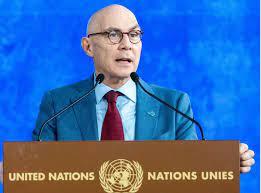
11 December 2023
https://www.ohchr.org/en/statements-and-speeches/2023/12/turk-opens-glob...
In the ashes of global warfare, it brought hope.
To put an end to cycles of bloodshed, it promised justice.
It promised development that would be secure; equitable; inclusive.
It set out the path to peace.
Because 75 years ago, in adopting the Universal Declaration of Human Rights, all Member States of the newly born United Nations acknowledged this deep truth: "recognition of the inherent dignity, and of the equal and inalienable rights of all members of the human family, is the foundation of freedom, justice and peace in the world.
Excellencies,
Colleagues,
Friends,
I am glad to welcome you to this global event. It encapsulates a year of passionate and probing conversations across the world about the Universal Declaration. And it seeks to project that energy forward, as we face our challenging future.
You, our participants, come from every region and many walks of life, and that diversity of origins and outlooks reminds us that the rights set out in the Universal Declaration are exactly that – universal.
Those who live in poverty – or those who glide through the corridors of power: all human beings are born equal in dignity and rights.
From this commitment, many movements of liberation have drawn their strength.
Women and men beaten down by exploitation stood up and demanded justice.
They joined independence movements, and toppled oppressive empires. They confronted repressive régimes and won freedom. They brought segregation and apartheid to an end. They created partnerships with former adversaries. They achieved accountability for unbearable crimes. And they struggled – and continue to struggle – for an end to all forms of discrimination. For social protection. For decent conditions of work.
This energy and vision on the part of communities across the world have nourished the immense creativity, and resulting development, that much of the world now enjoys.
But alongside the progress that has transformed many of our societies, there have also been numerous failures to uphold human rights over the past 75 years.
We live among such failures today – with the turmoil and suffering that they produce.
War: my thoughts go to the millions of people suffering unbearably in the Occupied Palestinian Territory, notably Gaza, and Israel; in Sudan; Ukraine; Myanmar; and so many other places.
Famine.
Oppressive and hateful discrimination.
Repression and persecution.
Threats to human rights generated by climate change, pollution and biodiversity loss.
These are profound and interlocking challenges that stem from the failure to uphold human rights.
The guide to their solution exists.
It was drawn up at a time of horror, after the most monstrous mass killing the world has ever known, in the form of the Holocaust – and with the knowledge that total destruction was growing closer. It has demonstrated its power and efficacy over decades. It bridges every sector of Government and field of human endeavour.
And it resonates with the ancient wisdom that connects all human beings.
The Universal Declaration is a river that has been nourished by many streams. Among them, let me pay tribute to the heroes of the Haitian revolution, who rose up to demand an end to enslavement and racist oppression. To the profound African values of interdependence, cooperation and collective responsibility. To Islam’s emphasis on human dignity and the principle of zakat, compassionate sharing. To the freedoms of the Enlightenment. To the proud feminism of India's Hansa Mehta. To the fundamental one-ness of Asian spiritual traditions. And to the insistence on universality and indivisibility of many Latin American voices.
The drafters of the Universal Declaration transcended geo-political clashes and economic differences. They set aside many terrible disputes to achieve this luminous text, which lit the path to peace, justice and freedom.
And so I view today’s event as a call to hope, and a call to action.
At a time of so little solidarity, and so much divisive and short-sighted vision, I view it as a call to overcome polarisation. A call to work, with courage and principles, together, to resolve the huge challenges we face.
A call to hark back to the spirit that led every Member State to adopt the Universal Declaration, and to base local, national and global decisions, across all areas of policy, on the intrinsic, and equal, value of every human life.
Thank you









